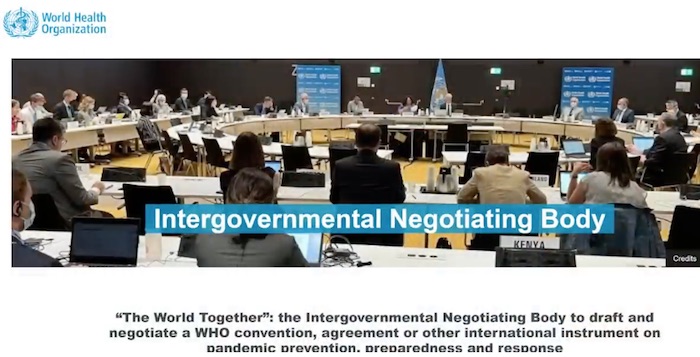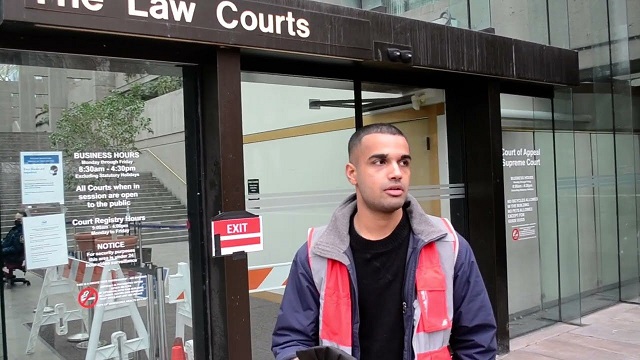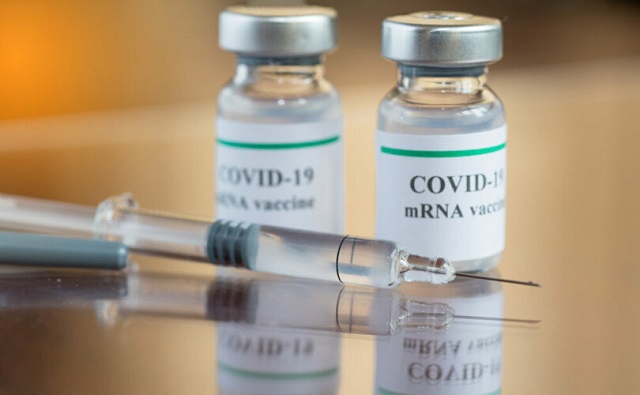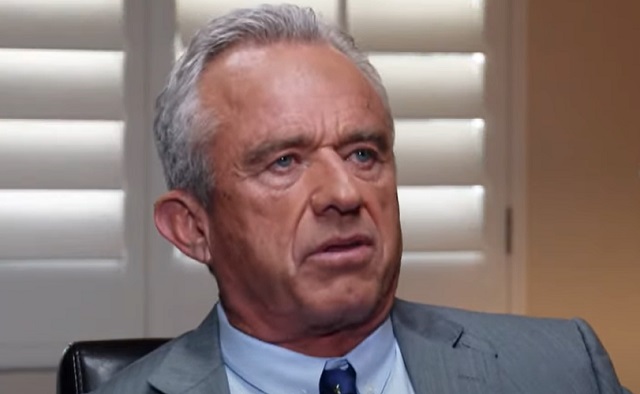Health
World Health Organization negotiating to take control “when the next event with pandemic potential strikes”

From Dr. John Campbell on Youtube
British Health Researcher Dr. John Campbell is raising the alarm about the latest moves by the World Health Organization to consolidate authority over governments all around the world.
As argued in UK Parliament, the World Health Organization is asking for a vast transfer of power and some MP’s are very much in favour of ceding power to the WHO.
In this video, Dr. Campbell outlines new regulations countries are currently negotiating to hand over vast new responsibilities to the WHO. The treaties would put the World Health Organization in charge – not just of the global health response, but of what information is shared, and how that information is shared. The regulations would also allow the WHO to take control not just in the event of a health emergency, but in the event of any emergency that could potentially impact public health.
From the commentary notes of Dr. John Campbell.
Countries from around the world are currently working on negotiating and/or amending two international instruments, which will help the world be better prepared when the next event with pandemic potential strikes.
The Intergovernmental Negotiating Body (INB) https://inb.who.int to draft and negotiate a convention, agreement or other international instrument to strengthen pandemic prevention, preparedness and response (commonly known as the Pandemic Accord).
Amendments to the International Health Regulations https://www.who.int/teams/ihr/working…) https://apps.who.int/gb/wgihr/pdf_fil… to amend the current International Health Regulations (2005) https://apps.who.int/gb/wgihr/ https://www.who.int/publications/i/it… 66 2005 articles
Underlined and bold = proposal to add text
Strikethrough = proposal to delete existing text (cut and paste does not copy strike through so I’ve put them in comic sans)
Article 1 Definitions
“standing recommendation” means non-binding advice issued by WHO
“temporary recommendation” means non-binding advice issued by WHO
Article 2 Scope and purpose including through health systems
readiness and resilience in ways that are commensurate with and restricted to public health risk – all risks – with a potential to impact public health,
Article 3 Principles
The implementation of these Regulations shall be with full respect for the dignity, human rights and fundamental freedoms of persons
Article 4 Responsible authorities
each State Party should inform WHO about the establishment of its National Competent Authority responsible for overall implementation of the IHR that will be recognized and held accountable
Article 5 Surveillance
the State Party may request a further extension not exceeding two years from the Director-General,
who shall make the decision refer the issue to World Health Assembly which will then take a decision on the same
WHO shall collect information regarding events through its surveillance activities
Article 6 Notification
No sharing of genetic sequence data or information shall be required under these Regulations.
Article 9: Other Reports
reports from sources other than notifications or consultations
Before taking any action based on such reports, WHO shall consult with and attempt to obtain verification from the State Party in whose territory the event is allegedly occurring
Article 10 Verification
whilst encouraging the State Party to accept the offer of collaboration by WHO, taking into account the views of the State Party concerned.
Article 11 Exchange of information
WHO shall facilitate the exchange of information between States Parties and ensure that the Event Information Site For National IHR Focal Points offers a secure and reliable platform
Parties referred to in those provisions, shall not make this information generally available to other States Parties, until such time as when: (e) WHO determines it is necessary that such information be made available to other States Parties to make informed, timely risk assessments.
Addictions
Why can’t we just say no?

From the Frontier Centre for Public Policy
Drug use and violence have become common place in hospitals. Drug-addicted patients openly smoke meth and fentanyl, and inject heroin. Dealers traffic illicit drugs. Nurses are harassed, forced to work amidst the toxic fumes from drugs and can’t confiscate weapons. In short, according to one nurse, “We’ve absolutely lost control.”
“Defining deviancy down” is a cultural philosophy that emerged in the United States during the 1990s.
It refers to society’s tendency to adjust its standards of deviancy “down,” so that behaviours which were once unacceptable become acceptable. Over time, this newly- acceptable behaviour can even become society’s norm.
Of course, the converse must also be true — society looks down on those who label social behaviours “wrong,” deeming them moralistic, judgemental or simply out of touch with the realities of modern life.
Thirty years later, this philosophy is entrenched in British Columbia politics and policies. The province has become a society that cannot say “no” to harmful or wrong behaviours related to drug use. It doesn’t matter if you view drug use as a medical issue, a law-and-order issue, or both – we have lost the ability to simply say “no” to harmful or wrong behaviour.
That much has become abundantly clear over the past two weeks as evidence mounts that BC’s experiment with decriminalization and safe supply of hard drugs is only making things worse.
A recently-leaked memo from BC’s Northern Health Authority shows the deleterious impact these measures have had on BC’s hospitals.
The memo instructs staff at the region’s hospitals to tolerate and not intervene with illegal drug use by patients. Apparently, staff should not be taking away any drugs or personal items like a knife or other weapons under four inches long. Staff cannot restrict visitors even if they are openly bringing illicit drugs into the hospital and conducting their drug transactions in the hallways.
The public was quite rightly outraged at the news and BC’s Health Minister Adrian Dix quickly attempted to contain the mess by saying that the memo was outdated and poorly worded.
But his facile excuses were quickly exposed by publication of the very clearly worded memo and by nurses from across the province who came forward to tell their stories of what is really happening in our hospitals.
The President of the BC Nurses Union, Adriane Gear, said the issue was “widespread” and “of significant magnitude.” She commented that the problems in hospitals spiked once the province decriminalized drugs. In a telling quote, she said, “Before there would be behaviours that just wouldn’t be tolerated, whereas now, because of decriminalization, it is being tolerated.”
Other nurses said the problem wasn’t limited to the Northern Health Authority. They came forward (both anonymously and openly) to say that drug use and violence have become common place in hospitals. Drug-addicted patients openly smoke meth and fentanyl, and inject heroin. Dealers traffic illicit drugs. Nurses are harassed, forced to work amidst the toxic fumes from drugs and can’t confiscate weapons. In short, according to one nurse, “We’ve absolutely lost control.”
People think that drug policies have no impact on those outside of drug circles – but what about those who have to share a room with a drug-smoking patient?
No wonder healthcare workers are demoralized and leaving in droves. Maybe it isn’t just related to the chaos of Covid.
The shibboleth of decriminalization faced further damage when Fiona Wilson, the deputy chief of Vancouver’s Police Department, testified before a federal Parliamentary committee to say that the policy has been a failure. There have been more negative impacts than positive, and no decreases in overdose deaths or the overdose rate. (If such data emerged from any other healthcare experiment, it would immediately be shut down).
Wison also confirmed that safe supply drugs are being re-directed to illegal markets and now account for 50% of safe supply drugs that are seized. Her words echoed those of BC’s nurses when she told the committee that the police, “have absolutely no authority to address the problem of drug use.”
Once Premier David Eby and Health Minister Adrian Dix stopped denying that drug use was occurring in hospitals, they continued their laissez-faire approach to illegal drugs with a plan to create “safe consumption sites” at hospitals. When that lacked public appeal, Mr. Dix said the province would establish a task force to study the issue.
What exactly needs to be studied?
The NDP government appears to be uninformed, at best, and dishonest, at worst. It has backed itself into a corner and is now taking frantic and even ludicrous steps to legitimize its experimental policy of decriminalization. The realities that show it is not working and is creating harm towards others and toward institutions that should be a haven for healing.
How quickly we have become a society that lacks the moral will – and the moral credibility – to just to say “no.”
Susan Martinuk is a Senior Fellow with the Frontier Centre for Public Policy and author of Patients at Risk: Exposing Canada’s Health-care Crisis.
Addictions
British Columbia should allow addicts to possess even more drugs, federal report suggests

From LifeSiteNews
Despite the drug crisis only getting worse in British Columbia after decriminalization, a federal report by the Canadian Institutes of Health Research advocates for further relaxing its policy so addicts can possess even more drugs.
Despite the drug crisis only worsening since decriminalization, federal researchers are now advocating for British Columbia to allow the possession of even larger quantities of cocaine, claiming that current possession limits don’t allow addicts to buy enough.
According to a federal report published April 23 by Blacklock’s Reporter, the current decriminalization program in British Columbia approved by Prime Minister Justin Trudeau’s government has set cocaine possession limits “too low.”
“People who use drugs are less concerned about being arrested and feel more comfortable carrying substances they need,” said the report by the Canadian Institutes of Health Research. “The threshold of 2.5 grams is too low and is unreflective of users’ substance use and purchasing patterns.”
Under the policy, which launched in early 2023, the federal government began allowing people within the province to possess up to 2.5 grams of hard drugs – including cocaine, opioids, ecstasy and methamphetamine – without criminal penalty, but selling drugs remained a crime.
The policy has been widely criticized, especially after it was found that the province broke three different drug-related overdose records in the first month the new law was in effect.
However, now researchers are claiming that the new policy is insufficient for drug users.
“People who use drugs indicated the 2.5 gram threshold is too low and unreflective of their substance use patterns,” the report stated. “Although some people indicated the policy wouldn’t impact their purchasing patterns because they are unable to purchase large amounts at a time, others suggested it may force them to seek out substances more frequently which could increase their risk of harms.”
“Buying in bulk may be more economical particularly for people who use drugs,” it continued, adding that it was “common practice to purchase in bulk and split or share among peers.”
The recommendation comes as deaths from drug overdoses in Canada have gone through the roof in recent years, particularly in British Columbia.
The effects of decriminalizing hard drugs in various parts of Canada has been exposed in Aaron Gunn’s recent documentary, Canada is Dying, and in U.K. Telegraph journalist Steven Edginton’s mini-documentary, Canada’s Woke Nightmare: A Warning to the West.
Gunn says he documents the “general societal chaos and explosion of drug use in every major Canadian city.”
“Overdose deaths are up 1,000 percent in the last 10 years,” he said in his film, adding that “[e]very day in Vancouver four people are randomly attacked.”
Similarly, even Liberals have begun to condemn Trudeau’s “safe supply” program, linking them to “chaos” in cities.
“Safe supply“ is the term used to refer to government-prescribed drugs that are given to addicts under the assumption that a more controlled batch of narcotics reduces the risk of overdose – critics of the policy argue that giving addicts drugs only enables their behavior, puts the public at risk, disincentivizes recovery from addiction and has not reduced, and sometimes even increased, overdose deaths where implemented.
Last week, Liberal MP Dr. Marcus Powlowski revealed that violence from drug users has become a problem in Ottawa, especially in areas near so-called “safe supply” drug sites which operate within blocks of Parliament Hill.
“A few months ago I was downtown in a bar here in Ottawa, not that I do that very often, but a couple of colleagues I met up with, one was assaulted as he was going to the bar, another one was threatened,” said Powlowski.
“Within a month of that I was returning down Wellington Street from downtown, the Rideau Centre, and my son who is 15 was coming after me,” he continued. “It was nighttime and there was someone out in the middle of the street, yelling and screaming, accosting cars.”
-

 Censorship Industrial Complex2 days ago
Censorship Industrial Complex2 days agoAustralian politicians attack Elon Musk for refusing to remove video of Orthodox bishop’s stabbing
-

 Alberta2 days ago
Alberta2 days agoAlberta official reveals ‘almost all’ wildfires in province this year have been started by humans
-

 Alberta2 days ago
Alberta2 days agoPolitical parties will be part of municipal elections in Edmonton and Calgary pilot projects
-

 Bruce Dowbiggin2 days ago
Bruce Dowbiggin2 days agoCome For The Graduate Studies, Stay For The Revolution
-

 Censorship Industrial Complex2 days ago
Censorship Industrial Complex2 days agoJordan Peterson, Canadian lawyer warn of ‘totalitarian’ impact of Trudeau’s ‘Online Harms’ bill
-

 COVID-1917 hours ago
COVID-1917 hours agoTrudeau gov’t has paid out over $500k to employees denied COVID vaccine mandate exemptions
-

 International17 hours ago
International17 hours agoRFK Jr tells EWTN: Politicization of the CIA, FBI, Secret Service under Biden is ‘very troubling’
-

 Addictions14 hours ago
Addictions14 hours agoWhy can’t we just say no?









